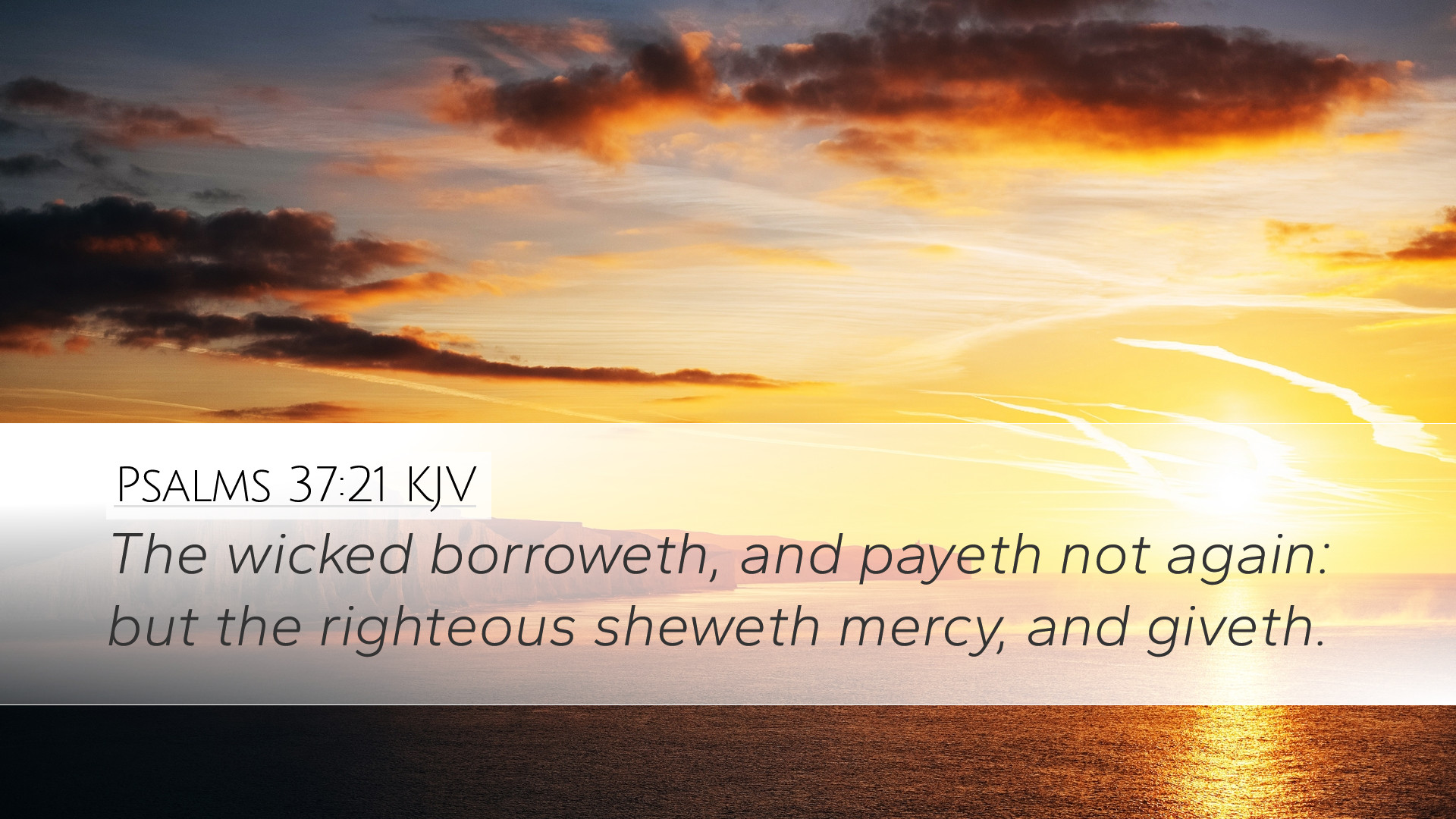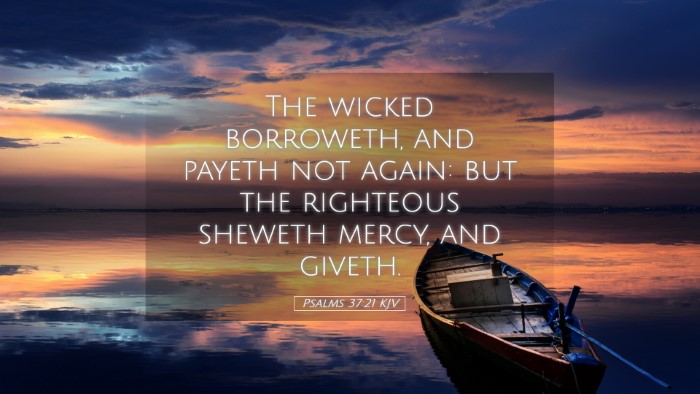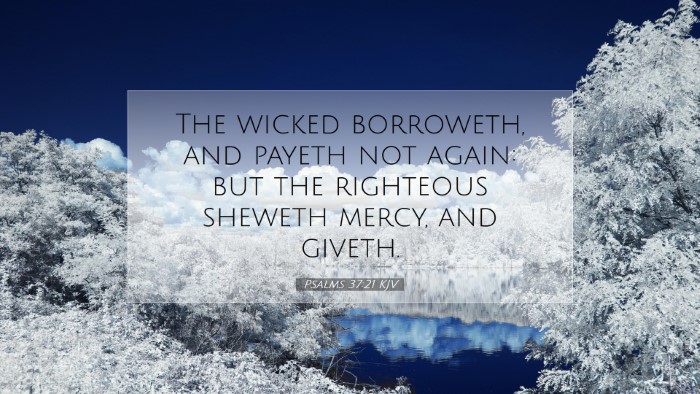Commentary on Psalm 37:21
Psalms 37:21 states: "The wicked borroweth, and payeth not again: but the righteous showeth mercy, and giveth." This verse presents a contrast between the behaviors of the wicked and the righteous, emphasizing the moral implications and spiritual principles underlying each behavior.
1. Overview of Psalm 37
The 37th Psalm is an intricate composition, addressing the reality of injustice in the world while assuring the faithful of God’s ultimate justice. It serves as a guide for those facing trials and witnessing the apparent prosperity of the wicked.
2. Insights from Matthew Henry
Matthew Henry, a prominent biblical commentator, offers a detailed examination of this verse:
- The Nature of Borrowing: Henry points out that borrowing in itself is not inherently wrong, but it denotes a condition of need. However, in contrasting the wicked with the righteous, he illustrates that the wicked, represented as borrowers, show a lack of responsibility and integrity.
- Failure to Repay: The wicked's failure to repay is a reflection of their character. It suggests a disregard for ethical obligations and a willingness to exploit the kindness of others. This aligns with the biblical principle that one's actions will ultimately reveal one’s true nature.
- The Righteous Response: In contrast, the righteous are characterized by mercy and generosity. The act of giving signifies a heart aligned with God’s principles and a commitment to serve others. Henry emphasizes that true righteousness is reflected in the selfless actions of giving rather than seeking personal gain.
3. Contributions from Albert Barnes
Albert Barnes further elaborates on the implications of this verse:
- The Contrast of Character: Barnes highlights that this verse succinctly encapsulates the fundamental difference between the wicked and the righteous. He notes that while the wicked are depicted as selfish and opportunistic, the righteous exhibit kindness and a desire to uplift others.
- God's Judgment: Barnes also reflects upon the broader context of divine justice, implying that those who engage in wrongful behaviors, such as the wicked who do not repay, will ultimately face God's judgment. This serves as a warning for all who engage in unethical practices.
- Trust and Provision: Righteous behavior, Barnes asserts, is rooted in faith. The righteous trust in God’s provision, allowing them to extend mercy and generosity without fear of their own needs going unmet. This trust in God's providence is a theme that resonates throughout the Psalms.
4. Insights from Adam Clarke
Adam Clarke offers another layer of understanding to this verse:
- Sociological Implications: Clarke examines the societal aspects of borrowing and repaying. He notes the dishonest dynamics that arise from the wicked's actions and the potential harm it inflicts on community relations. The wicked’s failure to repay not only speaks to personal integrity but affects social fabric.
- Mercy as a Virtue: Clarke emphasizes the concept of mercy, suggesting that the righteous do more than just not repay out of lack: they actively seek to bless others. This reflects a deeper theological commitment to the nature of God, who is merciful and compassionate.
- Spiritual Reflection: Clarke encourages readers to examine their own hearts. He prompts believers to ask themselves how they reflect God’s mercy and whether they, like the righteous, are living in a manner that embodies the selfless nature of God’s love.
5. Theological Implications
As we synthesize the insights from these public domain commentaries, several theological implications emerge:
- Integrity and Character: The actions of borrowing without intentions of repayment align with deeper issues of character. The righteous exhibit integrity in their dealings with others, serving as a light and example of Christ-like behavior.
- God’s Justice: The verse assures believers that despite the current circumstances where the wicked may seem to thrive, God’s ultimate justice will prevail. The righteous can find comfort in knowing that their acts of mercy are recognized and rewarded by God.
- Call to Generosity: This passage serves as a call to believers to embody generosity and mercy. It invites continual reflection on how one's actions align with God's call to care for others, particularly the marginalized and those in need.
6. Application for Today
In contemporary application, this verse offers a profound challenge to Christians concerning their interactions in a world where self-serving behaviors can be prevalent:
- Evaluate Personal Conduct: Individuals are encouraged to assess their motives in financial dealings and interpersonal relationships, ensuring they reflect the character of Christ.
- Pursue Merciful Living: Christians are called to live mercifully, not merely abstaining from wrongdoing, but actively contributing to the wellbeing of others. This includes practical demonstrations of generosity.
- Trust in Divine Justice: Believers are reminded to trust that God sees all and will execute justice in His timing. Patience during trials or when observing the wicked can cultivate a deeper faith.
Conclusion
Psalm 37:21 encapsulates the essence of two divergent paths: the attributes of the wicked versus the righteous. Through insights drawn from esteemed commentators like Matthew Henry, Albert Barnes, and Adam Clarke, the reflective nature of this verse points to broader themes of integrity, mercy, and divine justice. As such, it remains a relevant and vital exhortation for believers today to embody Christ-like qualities amid a world often marked by selfishness and deceit.


